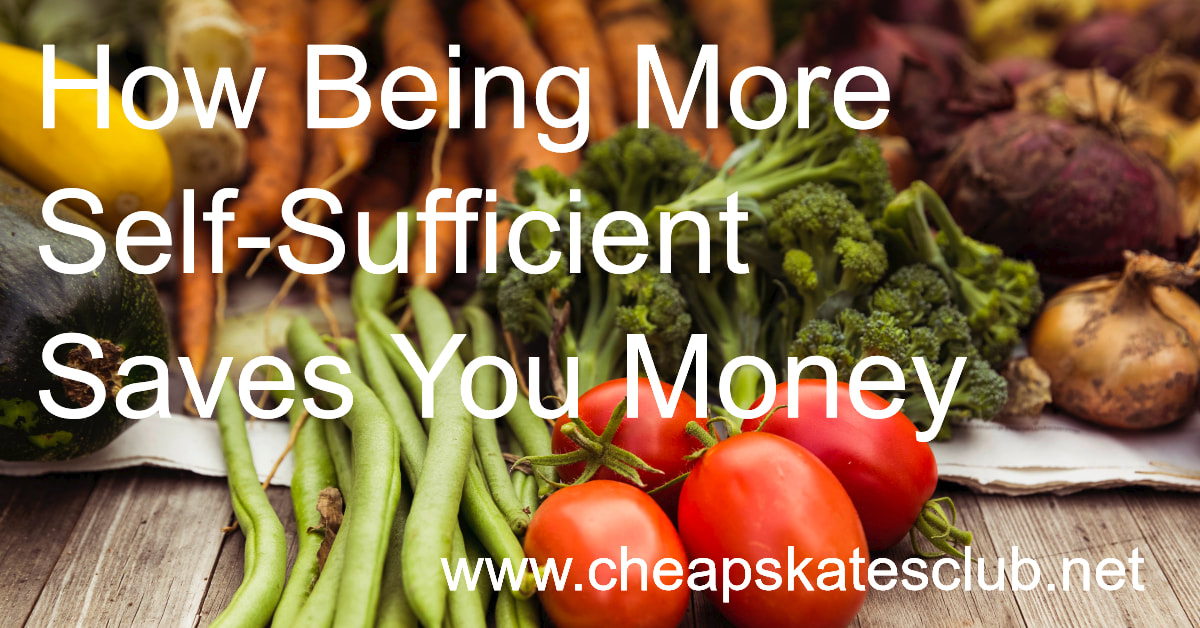How Being More Self-Sufficient Saves You Money
I saw a t-shirt at the market last week and it made me smile, so much so that I bought it as a Christmas gift for someone special. It said "It's not rocket surgery", a play on "it's not rocket science" and "it's not brain surgery".
Becoming more self-sufficient can help you save money in a wide variety of different ways, and that's not rocket surgery either.
Self-sufficiency doesn't mean you need to give up the conveniences of modern living, or live on mung beans and brown rice or spin your own yarn to knit into clothing. It simply means you take on the things you can do for yourself that you may otherwise have outsourced and paid for.
Being self-sufficient includes growing your own vegetables and cooking from scratch. It also includes mowing the lawn or washing the car instead of paying a gardener or driving through the car wash, saving that money for other things.
The first most obvious way to increase your self-sufficiency is to grow your own food. If you don't already, grow your own fruits, vegetables, spices and herbs. There are a so many different ways that you can grow your own food, including planting your own vegetable garden, growing non-hybrid vegetables and harvesting your own seeds, and using square foot gardening techniques in order to grow a lot of food in very small spaces.
Take the capabilities of your garden further by using organic mulch from local sources and using homemade compost or free manure in order to enrich the soil in your garden and you won't have to use commercial fertilizers, another dollar saving.
If you're just getting started, try growing potatoes. The humble spud is an easy crop to grow, albeit a little on the slow side. You can grow your own potatoes inexpensively (I grow our spuds in bags), then save the fingerling potatoes to plant next year. Nurseries keep seed potatoes, or you can order lovely heirloom varieties from the Diggers Club.
Another huge food expense for most of us is fruit. Consider creating your own small orchard and growing your own fruit, it's easier than you think. You can even get planter-pot-size varieties of many fruit trees. We have a mini orchard, of dwarf fruit trees, all in pots. We have lemon, grapefruit, mandarin, cumquat, lime, plum and orange trees, all growing happily in pots in our backyard. In the front yard we have a beautiful apple tree, that gives us enough apples to freeze and dry for the winter.
Becoming more self-sufficient can help you save money in a wide variety of different ways, and that's not rocket surgery either.
Self-sufficiency doesn't mean you need to give up the conveniences of modern living, or live on mung beans and brown rice or spin your own yarn to knit into clothing. It simply means you take on the things you can do for yourself that you may otherwise have outsourced and paid for.
Being self-sufficient includes growing your own vegetables and cooking from scratch. It also includes mowing the lawn or washing the car instead of paying a gardener or driving through the car wash, saving that money for other things.
The first most obvious way to increase your self-sufficiency is to grow your own food. If you don't already, grow your own fruits, vegetables, spices and herbs. There are a so many different ways that you can grow your own food, including planting your own vegetable garden, growing non-hybrid vegetables and harvesting your own seeds, and using square foot gardening techniques in order to grow a lot of food in very small spaces.
Take the capabilities of your garden further by using organic mulch from local sources and using homemade compost or free manure in order to enrich the soil in your garden and you won't have to use commercial fertilizers, another dollar saving.
If you're just getting started, try growing potatoes. The humble spud is an easy crop to grow, albeit a little on the slow side. You can grow your own potatoes inexpensively (I grow our spuds in bags), then save the fingerling potatoes to plant next year. Nurseries keep seed potatoes, or you can order lovely heirloom varieties from the Diggers Club.
Another huge food expense for most of us is fruit. Consider creating your own small orchard and growing your own fruit, it's easier than you think. You can even get planter-pot-size varieties of many fruit trees. We have a mini orchard, of dwarf fruit trees, all in pots. We have lemon, grapefruit, mandarin, cumquat, lime, plum and orange trees, all growing happily in pots in our backyard. In the front yard we have a beautiful apple tree, that gives us enough apples to freeze and dry for the winter.
